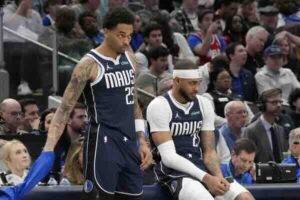How Does The NBA Generate Its Revenues?
Discover how the NBA generates its impressive revenues. From broadcasting rights to merchandise sales, uncover the secrets behind the league's financial success.

Have you ever wondered how the NBA manages to generate its impressive revenues? It's fascinating to see how a single sports league can generate billions of dollars each year. In this article, we will explore the different sources of revenue for the NBA and shed light on the strategies they employ to ensure their financial success. From broadcasting rights to merchandise sales, sponsorship deals to ticket sales, you'll discover the intricacies of the NBA's revenue generation and gain a deeper understanding of the business behind this beloved sport. So, let's embark on this captivating journey into the financial world of the NBA and uncover the secrets behind its remarkable success.
Television broadcasting rights
Television broadcasting plays a crucial role in the NBA's revenue generation. The league earns a substantial amount through national and regional broadcasting rights.
National broadcasting
National broadcasting rights refer to the deals made with major networks to broadcast NBA games nationally. These networks, such as ESPN and TNT, have extensive coverage and reach a vast audience, which translates into significant advertising revenue for the league. The NBA negotiates these contracts, which involve broadcasting regular-season games, playoffs, and the NBA Finals.
Television networks pay a hefty sum to secure the rights to broadcast these games, and the revenue generated from these agreements forms a significant portion of the NBA's income. The popularity of NBA games allows broadcasters to attract advertisers who want to reach a large and engaged audience. This symbiotic relationship between the NBA and broadcast networks is a key driver of the league's financial success.
Regional broadcasting
Apart from national broadcasting, the NBA also earns revenue through regional broadcasting arrangements. These deals allow local networks to televise games of specific teams in their respective regions. These regional sports networks (RSNs) pay to secure the rights to broadcast the games of their local teams.
Regional broadcasting is essential as it allows fans to watch their favorite teams' games, even if they are not nationally televised. Local networks often have dedicated pre and post-game shows and other content related to the teams they cover, further attracting viewers and advertisers. The revenue generated from these regional broadcasting agreements contributes significantly to the NBA's overall financial health.
Ticket sales
Ticket sales are another crucial aspect of the NBA's revenue generation. Fans flock to arenas across the country to witness the excitement and talent of their favorite teams and players.
Regular season games
During the regular season, NBA teams sell tickets to fans who want to attend the games in person. These ticket sales contribute to the league's revenue and help cover various expenses like player salaries and operational costs. The popularity of certain teams, superstar players, or highly anticipated matchups often drives up ticket prices and results in increased revenue.
Fans not only enjoy the game but also the overall experience of being in the arena. From grabbing a hot dog to participating in halftime entertainment, attending an NBA game offers a unique atmosphere that cannot be replicated elsewhere. The revenue generated from regular season ticket sales is an essential component of the NBA's overall financial success.
Playoff games
The NBA playoffs are a highly anticipated event, attracting fans from all over the world. As teams compete for the coveted championship, demand for playoff tickets skyrockets. Attending a playoff game is a unique and intense experience, as fans witness the highest level of competition and energy.
NBA teams capitalize on this demand by selling playoff tickets at elevated prices. The limited number of playoff games and the heightened anticipation result in increased demand, allowing teams to generate significant revenue from ticket sales. Additionally, playoff games often attract high-profile celebrities and corporate sponsors, further enhancing the value of attending these games.
Corporate sponsorships
Corporate sponsorships are a major source of revenue for the NBA. These partnerships involve companies sponsoring various aspects of the league, including teams, jerseys, and arenas.
Jersey sponsorships
One significant revenue stream comes from corporate sponsors who place their logos on NBA teams' jerseys. These jersey sponsorships allow companies to gain exposure to a wide audience during games, both in person and via television broadcasts. The NBA was one of the first major sports leagues in the United States to implement jersey sponsorships.
The revenue generated from these sponsorships is shared between the teams and the league. This additional funding enables teams to invest in player salaries, infrastructure, and fan engagement initiatives. Corporate sponsors benefit from the exposure and association with the NBA, while the league taps into the advertising budget of these companies, resulting in a mutually beneficial relationship.
Arena sponsorships
Another significant opportunity for corporate sponsorship is arena sponsorships. In many cases, NBA teams have deals with companies that result in the naming rights of their home arenas. These partnerships provide the sponsoring company with widespread exposure during games, events, and even concerts held in these venues.
Arena sponsorships generate substantial revenue for teams and the league alike. By associating with iconic stadiums and arenas, companies can boost their brand image and gain visibility among fans and spectators attending various events. From digital signage to promotions throughout the arena, these sponsors have numerous opportunities to engage with fans and maximize their return on investment.
Merchandise
Merchandise sales are a thriving revenue stream for the NBA. From jerseys to apparel and accessories, fans have a deep passion for owning and displaying their support for their favorite teams and players.
Jersey sales
Jersey sales are a significant contributor to the NBA's merchandise revenue. Fans love to wear the jerseys of their favorite players, showcasing their allegiance and admiration. Whether it's the iconic number 23 of Michael Jordan or the latest design of LeBron James, jerseys are a must-have for many fans.
The NBA offers a wide range of jerseys, including those of current players, throwback designs, and even customized options. Jersey sales are not limited to just the home market but are popular globally, as fans worldwide proudly represent their favorite teams. The revenue generated from these sales plays a significant role in the overall financial success of the league.
Apparel and accessories
In addition to jerseys, the NBA's merchandise revenue is supplemented by apparel and accessories. From t-shirts and hoodies to hats and collectible items, fans can display their team pride in various ways. The league and its teams continuously introduce new designs and collaborations to cater to the diverse tastes and preferences of fans.
Apparel and accessories sales are not restricted to game days alone. Fans proudly wear NBA-branded clothing in their daily lives, extending the league's visibility beyond the court. The revenue generated from merchandise sales, including apparel and accessories, helps support the growth and development of the NBA.
International broadcasting
The NBA's global popularity provides opportunities for significant revenue generation through international broadcasting. The league's captivating style of play and superstar players have garnered a massive following outside of North America.
Global distribution
The NBA has a robust international broadcasting network, allowing fans worldwide to watch games. International distribution deals enable broadcasters to bring NBA games live to countries around the globe, capturing the attention of diverse audiences. The revenue generated from these broadcast agreements depends on factors such as market size, demand, and local advertising opportunities.
Global distribution not only generates revenue through broadcasting rights but also contributes to the overall growth and popularity of the NBA. By expanding its reach to international markets, the league taps into new fan bases and opportunities for brand partnerships and collaborations.
Licensing agreements
Beyond broadcasting, the NBA utilizes licensing agreements to generate revenue from international markets. These agreements involve granting the right to produce and sell NBA-branded merchandise like apparel, accessories, video games, and more. Licensing deals are made with companies in various countries, allowing them to create products that cater to their specific markets.
The revenue generated from licensing agreements provides an additional source of income for the NBA. Fans from different countries can support their favorite teams and players by purchasing officially licensed merchandise unique to their region. The popularity and global reach of the NBA make licensing agreements an appealing prospect for companies seeking to associate with the league's brand.
Online streaming
In today's digital age, online streaming has become a significant revenue source for the NBA. With the rise of technological advancements, fans can now watch games live or on-demand through various platforms.
NBA League Pass
NBA League Pass is an online streaming subscription service that allows fans to access live and archived games throughout the season. Subscribers can watch games on their smartphones, tablets, or other digital devices, providing them with flexibility and convenience. NBA League Pass is available both domestically and internationally, contributing to the league's global reach.
The league earns revenue through the subscriptions to NBA League Pass. Fans who do not have access to televised games or prefer the convenience of streaming can opt for this service. It offers additional features like alternate camera angles, statistical analysis, and customized viewing experiences. The convenience and extensive coverage of NBA League Pass make it an attractive choice for fans worldwide, contributing to the NBA's revenue stream.
Digital platforms
In addition to NBA League Pass, the NBA leverages various digital platforms to reach and engage with fans. Social media platforms like Instagram, Twitter, and Facebook allow the league to share highlights, behind-the-scenes content, and interact with fans on a global scale. The NBA's official website and mobile applications further enhance fan engagement through news, analysis, and interactive features.
The revenue generated through online streaming and digital platforms comes from advertising partnerships and sponsorships. Companies eager to engage with the NBA's digital audience can advertise on these platforms, reaching millions of fans worldwide. The NBA strategically utilizes these avenues to strengthen its brand, deepen fan connections, and increase revenue through advertising and partnerships.
Advertising
Advertising is a significant revenue stream for the NBA, both in-game and digitally.
In-game advertising
In-game advertising allows companies to promote their products and services during NBA games. From courtside signage and billboards to branded displays and promotional events, the NBA provides numerous opportunities for advertisers to connect with fans. Companies can strategically place their brand in prominent locations within arenas, maximizing visibility and exposure.
Additionally, in-game advertising extends beyond physical placements. The NBA embraces digital advertising, utilizing video boards, LED screens, and in-arena apps to deliver targeted messages to the audience. Companies can leverage the large TV and online viewership to capture the attention of fans worldwide. The revenue generated from in-game advertising contributes significantly to the NBA's financial success.
Digital advertising
Digital advertising is a vital component of the NBA's revenue stream. The league's website, mobile applications, and social media platforms attract a vast online audience, creating opportunities for targeted advertisements. Advertisers can reach fans through various digital channels, including display ads, pre-roll videos, and sponsored content.
Digital advertising offers a unique advantage, as it enables companies to track and measure the effectiveness of their campaigns. By partnering with the NBA, advertisers can leverage the league's online presence and engage with a passionate fan base. The revenue generated from digital advertising helps support the growth and development of the NBA's digital platforms and initiatives.
Player endorsements
Player endorsements are a significant source of revenue for both the NBA and individual players. Companies recognize the influence and star power of NBA players and capitalize on their popularity to promote their brands and products.
Brand partnerships
Companies often enter into long-term partnerships with NBA players, creating mutually beneficial brand collaborations. These partnerships involve players representing and endorsing a specific brand or product. Companies leverage the players' popularity and connection with fans to increase brand awareness and sales.
Brand partnerships provide players with a substantial additional income stream beyond their NBA salaries. Players become ambassadors for the brand, appearing in advertisements, participating in promotional events, and endorsing products. The NBA benefits from these partnerships through the exposure and association with popular players, contributing to the overall revenue generation of the league.
Product endorsements
NBA players frequently endorse products and services through individual agreements. Whether it's athletic gear, sports drinks, or lifestyle brands, players lend their image and reputation to enhance the marketability of these products. Product endorsements often include television commercials, print advertisements, social media promotions, and more.
Players earn significant revenue from these product endorsements, turning their public persona into a valuable asset. The NBA benefits indirectly from these endorsements, as the popularity and success of its players reflect positively on the league as a whole. The revenue generated through player endorsements contributes to the overall financial success of the NBA.
Revenue sharing
The NBA employs revenue-sharing mechanisms to promote financial equity among teams and ensure the overall success and stability of the league.
Basketball Related Income (BRI)
The NBA determines its revenue through Basketball Related Income (BRI), which includes various revenue streams like ticket sales, broadcasting rights, merchandise sales, and more. A certain percentage of BRI is allocated as the players' share, reflecting the NBA Players Association's agreement. The remaining BRI, known as the "basketball-related income pool," is shared among the teams.
Revenue sharing helps maintain a competitive balance among teams, particularly those based in smaller markets. It allows teams with lower revenue streams to access funds generated by larger-market teams, ensuring the viability and sustainability of the entire league. This revenue-sharing model promotes fairness, competitiveness, and financial stability within the NBA.
Luxury tax
In addition to revenue sharing, the NBA utilizes a luxury tax system to further encourage financial balance among teams. The luxury tax imposes a financial penalty on teams that exceed the specified salary cap limit. The tax amount is determined based on the team's payroll and the extent to which it exceeds the cap.
The luxury tax helps prevent teams with more significant financial resources from solely dominating the league. When teams exceed the salary cap, they must pay a tax, and the revenue generated from these penalties is redistributed to teams that are under the salary cap. This mechanism further promotes competitive balance and financial stability within the NBA.
NBA Finals
The pinnacle of the NBA season is the NBA Finals, where the two best teams compete for the championship. The Finals attract immense attention from fans globally, creating various revenue opportunities for the league.
Ticket sales
NBA Finals tickets are highly coveted, as fans want to witness the culmination of the season's excitement firsthand. The limited number of Finals games increases demand, leading to elevated ticket prices. Fans are willing to pay a premium to witness history in the making and see their favorite teams battle for the title.
The revenue generated from NBA Finals ticket sales is significant, contributing to the league's financial success. In addition to the ticket revenue, the NBA Finals attract high-profile corporate sponsors, celebrities, and international spectators, further enhancing the financial impact of this marquee event.
Television rights
The NBA Finals are broadcasted worldwide, captivating audiences across the globe. Television networks eager to secure the rights to broadcast the Finals pay substantial amounts to the NBA, generating considerable revenue for the league. These networks recognize the unparalleled excitement and intensity of the Finals, attracting millions of viewers and advertisers.
The revenue generated from television rights for the NBA Finals forms a crucial source of income for the league. The high viewership allows advertisers to reach a massive audience, further increasing the value of these broadcast agreements. The NBA Finals serve as a grand culmination of the season, showcasing the league's popularity and revenue-generating capabilities.
In conclusion, the NBA employs a myriad of revenue-generating strategies to maintain its financial success. From television broadcasting rights and ticket sales to corporate sponsorships, merchandise, and international distribution, the league capitalizes on its global appeal and passionate fan base. Additionally, online streaming, player endorsements, advertising, revenue sharing, and marquee events like the NBA Finals contribute to the NBA's overall revenue generation. Through these diverse revenue streams, the NBA continues to grow and thrive, bringing the excitement of basketball to fans worldwide.

